|
|
|
Sort Order |
|
|
|
Items / Page
|
|
|
|
|
|
|
| Srl | Item |
| 1 |
ID:
164439
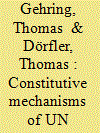

|
|
|
|
|
| Summary/Abstract |
Based upon the current debate on international practices with its focus on taken-for-granted everyday practices, we examine how Security Council practices may affect member state action and collective decisions on intrastate conflicts. We outline a concept that integrates the structuring effect of practices and their emergence from interaction among reflective actors. It promises to overcome the unresolved tension between understanding practices as a social regularity and as a fluid entity. We analyse the constitutive mechanisms of two Council practices that affect collective decisions on intrastate conflicts and elucidate how even reflective Council members become enmeshed with the constraining implications of evolving practices and their normative implications. (1) Previous Council decisions create precedent pressure and give rise to a virtually uncontested permissive Council practice that defines the purview for intervention into such conflicts. (2) A ratcheting practice forces opponents to choose between accepting steadily reinforced Council action, as occurred regarding Sudan/Darfur, and outright blockade, as in the case of Syria. We conclude that practices constitute a source of influence that is not captured by the traditional perspectives on Council activities as the consequence of geopolitical interests or of externally evolving international norms like the ‘responsibility to protect’ (R2P).
|
|
|
|
|
|
|
|
|
|
|
|
|
|
|
|
| 2 |
ID:
164436


|
|
|
|
|
| Summary/Abstract |
What are the politics of, and prospects for, contemporary weapons control? Human rights and humanitarian activists and scholars celebrate the gains made in the UN Arms Trade Treaty as a step towards greater human security. Critics counter that the treaty represents an accommodation with global militarism. Taking the tensions between arms transfer control and militarism as my starting point, I argue that the negotiating process and eventual treaty text demonstrate competing modes of militarism. Expressed in terms of sovereignty, political economy, or human security, all three modes are underpinned by ongoing imperial relations: racial, gendered, and classed relations of asymmetry and hierarchy that persist despite formal sovereign equality. This means human security is a form of militarism rather than the antithesis of it. Drawing on primary sources from negotiations and participant observation with actors involved in the campaign for the ATT, the argument challenges the idea that human security has scored a victory over militarism. It also complicates our understanding of the nature of the accommodation with it, demonstrating the transformation as well as entrenchment of contemporary militarism. The argument reframes the challenges for controlling weapons circulation, placing the necessity for feminist, postcolonial anti-militarist critique front and centre.
|
|
|
|
|
|
|
|
|
|
|
|
|
|
|
|
| 3 |
ID:
164434


|
|
|
|
|
| Summary/Abstract |
Human rights violations committed by international organisations (IOs) have raised demands that IOs should be held accountable for their decisions, policies, and actions. However, traditional forms of accountability have often failed in the context of global governance. This article introduces pluralist accountability as a form of accountability whereby third parties hold IOs and their implementing partners accountable for human rights violations. In pluralist accountability, third parties set the standards for IOs’ actions in relation to human rights, review their behaviour and impose normative or material sanctions in case of misbehaviour. The article further reveals two conditions that foster the development of pluralist accountability, namely the competition among third parties and the degree of vulnerability of the implementing actors or the mandating authority with regard to human rights demands. This argument is illustrated with empirical insights from peace operations in Bosnia and Kosovo, which were accused of human trafficking and the violation of the rights of detainees.
|
|
|
|
|
|
|
|
|
|
|
|
|
|
|
|
| 4 |
ID:
164438
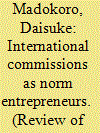

|
|
|
|
|
| Summary/Abstract |
Discussion in international relations often centres on a wide variety of norms, such as sustainable development, global governance, human security, and the responsibility to protect. A significant amount of work focuses on not only the theoretical and policy development of these norms but also the role of various norm entrepreneurs in promoting norm emergence and diffusion. Yet there are still knowledge gaps regarding the norm entrepreneurship role of international commissions that engage in the early stage of the emergence of these norms and their processes. This article elucidates the process of creation of normative ideas by analysing the role of international commissions as norm entrepreneurs, utilising a case study of the International Commission on Intervention and State Sovereignty (ICISS), which proposed the normative idea of the responsibility to protect (R2P) in 2001. The theoretical contribution of this article is to expand the understanding of norm entrepreneurship by adding international commissions to the universe of norm entrepreneurs and illuminating their strategies for constructing normative ideas. Empirically, it explores the role and activities of the ICISS in creating the normative idea of R2P, which contrasts the existing literature that has only focused on the development of R2P after the Commission has finished its work.
|
|
|
|
|
|
|
|
|
|
|
|
|
|
|
|
| 5 |
ID:
164433
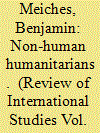

|
|
|
|
|
| Summary/Abstract |
The study of humanitarian intervention typically focuses on the human victims and saviours in armed conflict and natural disasters. Moreover, explanations of the virtues of humanitarian norms and ethics emphasise the importance of the university of suffering and the empathic nature of humanitarian efforts. In contrast, this article explores the neglected world of ‘non-human humanitarians’. Specifically, the article outlines three cases of non-human actors that expand and complicate international humanitarian practices: dogs, drones, and diagrams. Drawing on new materialist and posthuman literatures, the article argues that non-humans possess distinct capacities that vastly expand and transform humanitarian efforts in ranging from relief, to medicine, to conflict resolution. Highlighting non-human humanitarians thus offers a new perspective on the resources available for redressing mass violence and conflict, but also complicates existing definitions of humanitarian norms. To the contrary, the article demonstrates that non-humans often maximise humanitarian services to a degree greater than their human counterparts, but have also introduced changes into humanitarian practices that have problematic unintended consequences. Non-human humanitarians reveals previously discounted participants in international politics and the key roles they play in various international interventions.
|
|
|
|
|
|
|
|
|
|
|
|
|
|
|
|
| 6 |
ID:
164440


|
|
|
|
|
| Summary/Abstract |
What is a Classical Realist analysis of climate ethics and politics? Classical Realist ethical analysis differs from ideal normative theory in that it addresses state decision-makers rather than individuals, assumes highly imperfect compliance with the demands of justice, and is concerned with feasibility and transition rather than end-states. Classical Realists urge leaders to prioritise state security over private moral concerns, to assess rival policies against their likely consequences and to seek the ‘lesser evil’ among feasible choices. But how does Realism respond when the prudent pursuit of state security risks rendering much of the planet uninhabitable? In the 1950s, the development of the hydrogen bomb created just such a dilemma as status quo politics now carried a significant risk of thermonuclear omnicide. In response, Hans Morgenthau argued that states should manage systemic risk by working in concert to safeguard expanded, collective national interests. The Classical Realist mode of thought suggests an analogous response to systemic climate risks: states’ conceptions of national interest must expand to include cooperative system-preservation alongside traditional security concerns. Classical Realist arguments might then be mobilised to overcome resistance from vested interests and to support state-directed low carbon innovation, adaptation and mitigation agreements that prioritise ambition over distributional justice.
|
|
|
|
|
|
|
|
|
|
|
|
|
|
|
|
| 7 |
ID:
164435
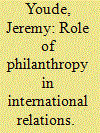

|
|
|
|
|
| Summary/Abstract |
Global philanthropy is a significant source of financial resources in contemporary international relations, and it has provoked intense debates about the appropriateness of involving private foundations in global policymaking. Despite these facts, International Relations as a discipline has shown remarkably little reference to philanthropy as an important and relevant actor in global politics. In this article, I make the case for explicitly incorporating philanthropy into international relations analyses. Drawing on both historical examples and contemporary cases from the global health space, I show how philanthropy exerts a unique and independent influence within international society and that it needs to be understood holistically rather than focusing solely on individual philanthropic organisations. I also discuss how this expanding influence raises serious questions about accountability and legitimacy. Rather than making an argument about the appropriateness of philanthropy’s involvement in international society, this article aims to make the case for philanthropy’s analytical inclusion within the discipline.
|
|
|
|
|
|
|
|
|
|
|
|
|
|
|
|
| 8 |
ID:
164437
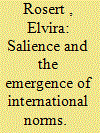

|
|
|
|
|
| Summary/Abstract |
This article theorises salience – defined as the amount of attention granted to an issue – as an explanatory factor for the emergence and non-emergence of norms, and shows how salience affects existing explanations such as issue adoption by norm entrepreneurs, mobilisation, social pressure, and framing. The relevance of salience is demonstrated by exploring the question of why the norm against incendiary weapons was adopted in the Convention on Certain Conventional Weapons (CCW) in 1980, and why the norm against cluster munitions was not, even though both weapons were deemed particularly inhumane and thus, put on the agenda when the CCW negotiations started in 1978. Drawing on secondary sources and on original data from public and institutional discourses, I study the influence of salience on the emergence of the anti-napalm norm and the non-emergence of the anti-cluster munitions norm in the period of 1945–80. The results demonstrate that and how the discrepancy in salience of the napalm and the cluster munitions issues mattered for the outcomes of the two norm-setting processes.
|
|
|
|
|
|
|
|
|
|
|
|
|
|
|
|
|
|
|
|
|